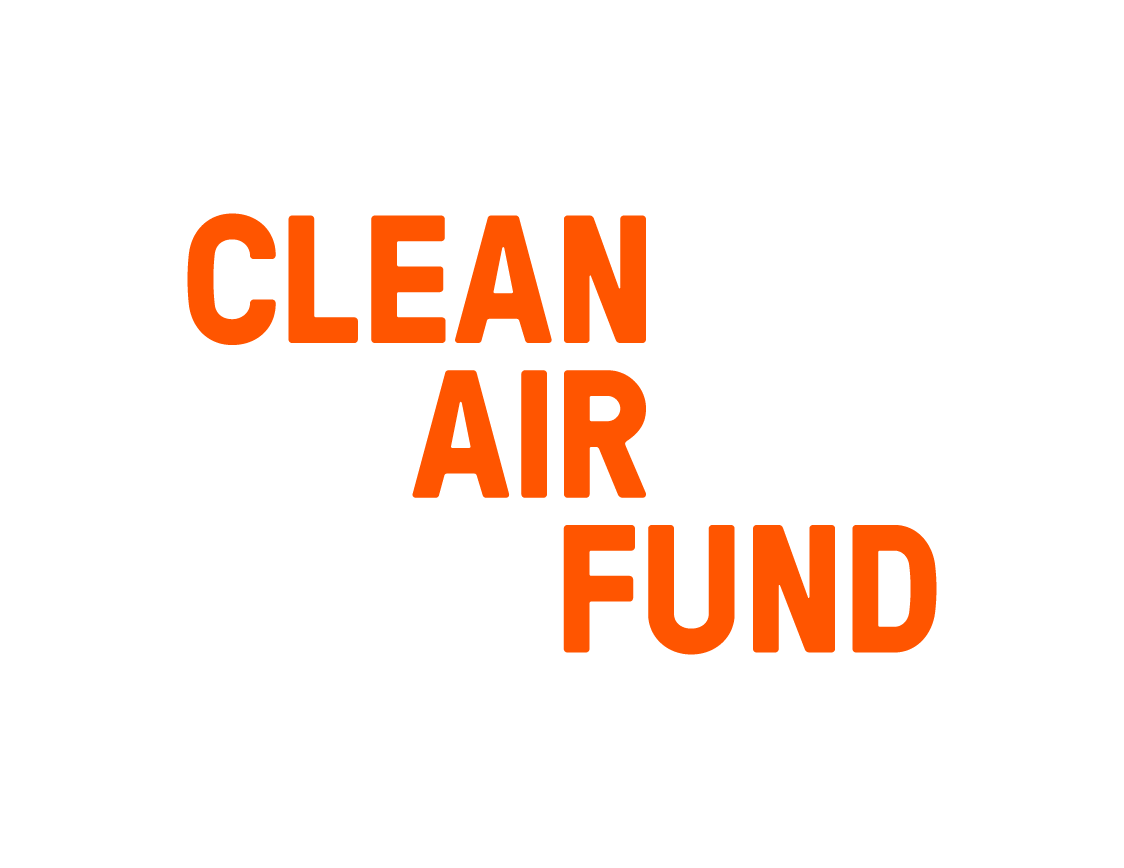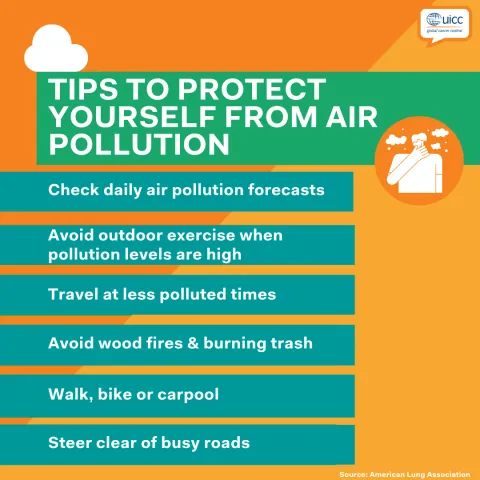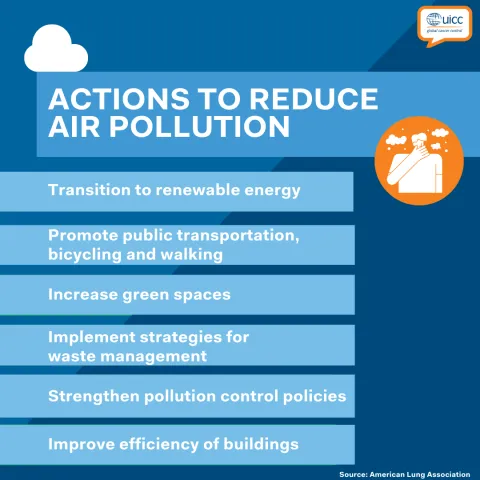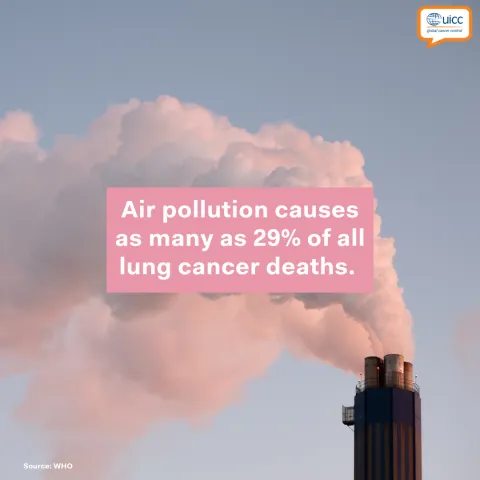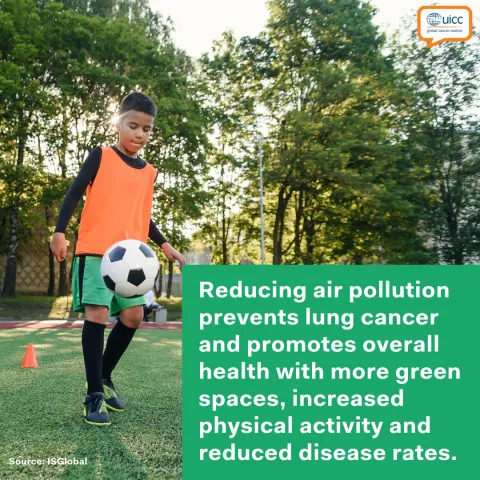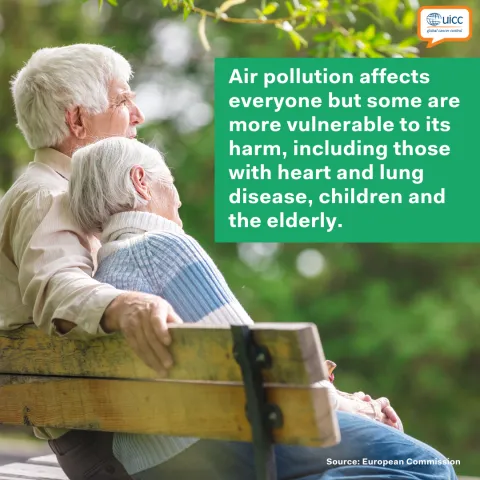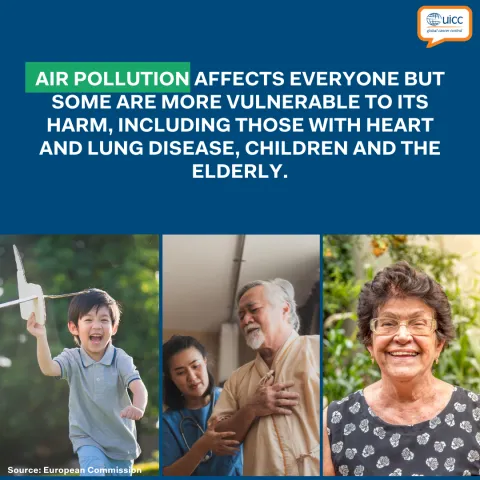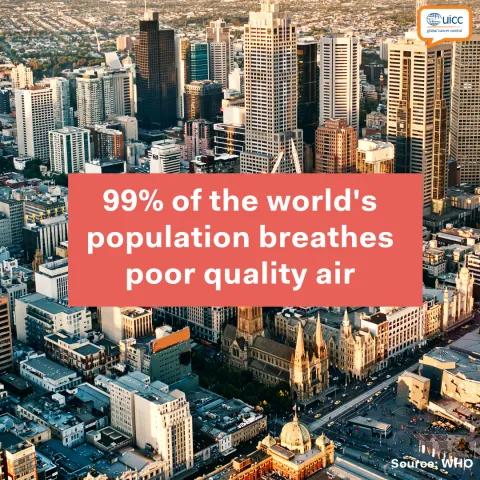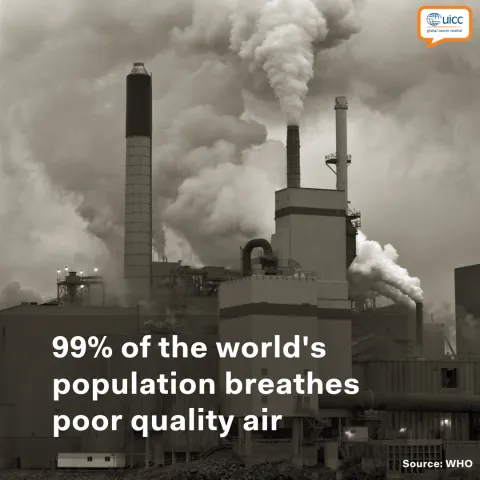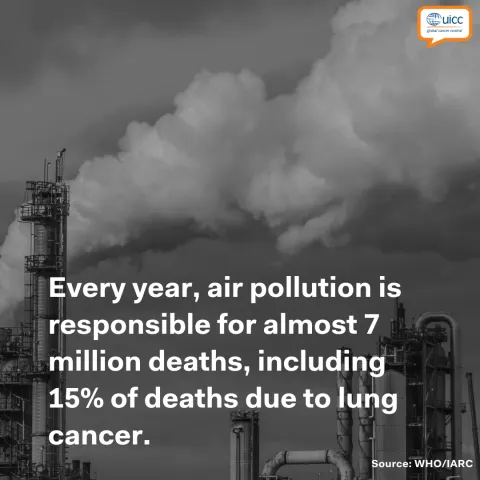Cancer and air pollution
Exposure to air pollution can lead to cancer, stroke, respiratory, cardiovascular diseases and other health issues. Nearly half of lung cancer cases in people who have never smoked are estimated to be related to air pollution.
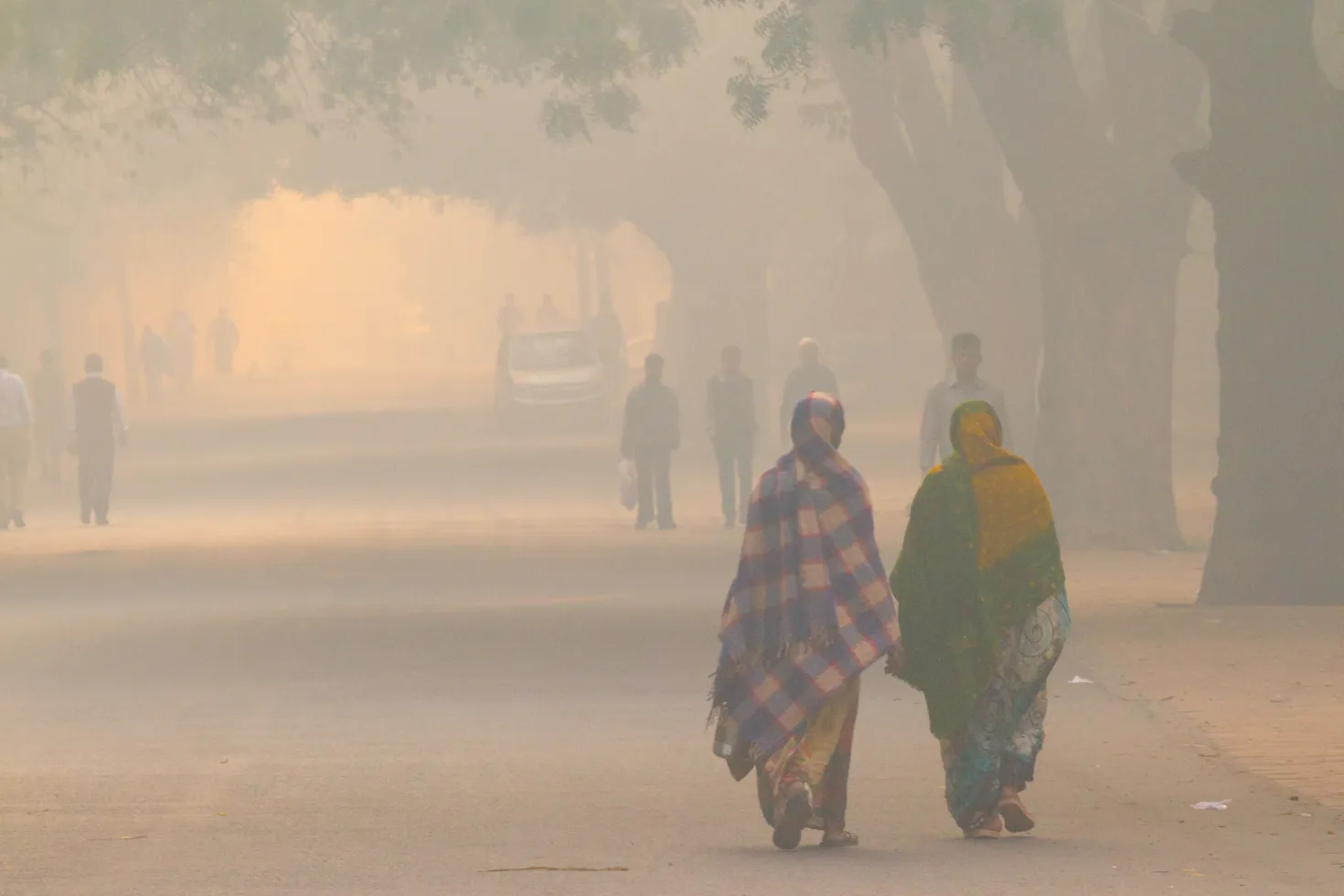
Air pollution is a significant and far-reaching threat to public health, with 99% of the world’s population breathing unhealthy air, according to the World Health Organization (WHO).
The risks associated with air pollution are similar to those caused by smoking tobacco. Indeed, exposure to air pollution can lead to cancer, stroke, respiratory, cardiovascular diseases and other health issues. It contributed in 2021 to an estimated 18.6% of all lung cancer deaths worldwide.
Air pollution is now estimated to contribute to an estimated 8.1 million deaths every year. This figure is comparable to the excess mortality caused by COVID-19 in 2020 and 2021. Low- and middle-income countries pay the heaviest toll, accounting for nearly 90% of premature deaths related to air pollution.
Air pollution is threatening progress being made in reducing the burden of cancer worldwide by contributing to the rise of the number of cancer diagnoses each year – cancers that are preventable. Reducing air pollution only directly mitigates the risk of developing lung cancer, but the actions to do so – increased green spaces, cleaner energy sources, active transportation (walking and cycling) – also leads to a range of health benefits, including healthier diet, increased physical activity and lower rates of other non-communicable diseases and co-morbidities – which can reduce the likelihood of developing other cancers.
More immediately, air pollution can negatively impact the quality of life of people living with cancer by exacerbating respiratory symptoms, increasing fatigue, reducing physical activity, and worsening treatment side effects. It may also interfere with cancer treatments by reducing the effectiveness of chemotherapy drugs, increasing surgical complications, and potentially interacting with targeted therapies and immunotherapies.
The global cost of health damages associated with exposure to air pollution is estimated at USD 8.1 trillion, equivalent to 6.1% of global GDP, according the World Bank.
The benefits of reducing exposure to air pollution are far reaching.

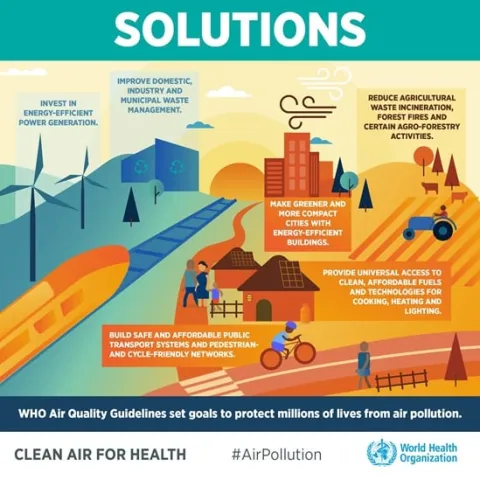
Causes of air pollution
Air pollution is caused by fine particulate matter – tiny airborne particles known as PM2.5 that are 2.5 micrometers in diameter or smaller – which is a mix of solid particles and liquid droplets that can penetrate deep into the lungs and even enter the bloodstream.
This particulate matter includes soil, dust, soot and smoke. It comes from various sources, such as coal- and natural gas-fired plants, cars, agriculture, wildfires, wood-burning stoves, unpaved roads and construction sites.
UICC Podcast on air pollution
Exposure to particle pollution can cause changes in airway cells that trigger lung cancer. Studies have shown that these changes are visible in about half of people with lung cancer who have never smoked.
At the ESMO 2022 Presidential Symposium, Prof. Charles Swanton of the Francis Crick Institute presented research that highlighted the same particles that contribute to climate change are impacting human health via an important cancer-causing mechanism in lung cells.
The Lancet Commission on pollution and health established that all forms of pollution cause 43% of lung cancer deaths. Air pollution alone causes up to 29% of all lung cancer deaths. The decrease in deaths due to indoor pollution has been outpaced by the significant rise in outdoor air pollution.
What can be done
Governments around the world have acknowledged the adverse effects of household and ambient air pollution on their populations, but work to address these risk factors has been uneven. 6,000 cities in 117 countries now measure air quality but there is no evidence that this monitoring has yet led to an improvement in air quality. In fact, not a single one of the world’s 100 biggest cities managed to meet WHO air pollution guidelines.
In 2015, governments adopted a resolution at the World Health Assembly, which recognises that air pollution causes global health inequities, disproportionately affecting children, women and older adults, as well as low-income populations. In response, WHO developed an action plan to respond to the impacts of air pollution on different populations and is developing a series of cost-effective measures to accompany the NCD ‘Best Buys’. It has issued global Air Quality Guidelines.
The United Nations have called for an end to the financing of fossil fuels, and urge governments to enforce effective regulation to curb emissions and reduce the use of fossil fuels and other air pollutants. There is also a need for global development initiatives to help lower-income countries transition to cleaner household heating and cooking materials and cleaner energy sources.
WHO has issued new Global Air Quality Guidelines to assist governments in developing effective policies, such as:
-
prioritise the reduction of air pollution in urban areas;
-
promote active transport (e.g., cycling and walking);
-
reduce vehicle emissions;
-
transition to cleaner energy sources;
-
address indoor air pollution, particularly in households that rely on solid fuels for cooking and heating;
-
develop national air quality standards and regulations;
-
establish air quality monitoring systems to track progress towards meeting these standards.
Other tools designed by WHO include AirQ+, a software to assess health risks associated with air pollution, and the Carbon Reduction Benefits on Health (CaRBonH) calculation tool, which enables governments to quantify the physical and economic benefits achieved through improvements in country-level air quality.
UICC’s work
In 2023, UICC applied for a grant from the Clean Air Fund to fund a two-year project aimed at raising awareness among UICC’s membership and beyond about air pollution as a major preventable cancer risk factor and to advocate for clean air action.
The project has several objectives:
-
Establish an expert group to synthesise the latest global evidence, spotlight best practices and identify research gaps on the impact of air pollution on cancer in a series of reports.
-
Implement a communication campaign to raise awareness and understanding of air pollution as a cancer risk factor, including at the World Cancer Leaders’ Summit and the World Cancer Congress.
-
Support a World Health Assembly resolution on climate change and health, working with Member State to encourage governments to take more action nationally.
UICC's work on air pollution is supported by:
Reducing air pollution prevents lung cancer and promotes overall health with more green spaces, increased physical activity and reduced disease rates. #CleanAir #AirPollution @uicc
Air pollution affects everyone, but some are more vulnerable to its harm, including those with heart and lung disease, children and the elderly. Let's work together to reduce air pollution and protect our health. #CleanAir #AirPollution @uicc
Short-term exposure to elevated levels of air pollution can affect lung function, exacerbate asthma, and even cause death. Long-term exposure can also cause chronic conditions like cardiovascular and respiratory diseases, and lung cancer. #CleanAir #AirPollution @uicc
Exposure to elevated levels of air pollution can affect lung function, exacerbate asthma, and cause cardiovascular and respiratory diseases as well as lung cancer. Let's take action to reduce air pollution and protect our health. #CleanAir #AirPollution @uicc
Did you know that not a single one of the world's 100 biggest cities meets WHO air pollution guidelines? 99% of the world's population breathes unhealthy air! Let's work together to reduce air pollution and create a healthier environment for ourselves and future generations. #CleanAir #AirPollution @uicc
Every year, air pollution is responsible for almost 7 million deaths, including 29% of deaths due to lung cancer. #CleanAir #AirPollution @uicc
Latest UICC news and blog articles on air pollution
Why clean air matters for cancer care and people living with cancer

WHA78 charts a path towards more equitable, sustainable global health systems
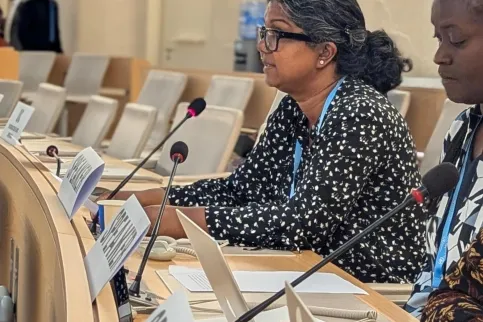
UICC to advance lung cancer resolution at the World Health Assembly

References
- World Health Organization: “Air pollution”
- World Economic Forum
- World Bank: The Global Health Cost of PM2.5 Air Pollution
- European Society for Medical Oncology
- The Lancet Commission on pollution and health
- World Health Organization: “Air pollution in cities”
- Our World in Data: “Air pollution”
- WHO Global Air Quality Guidelines
- American Cancer Society
- National Cancer Institute
- Environmental Protection Agency
- AirQ+: software tool for health risk assessment of air pollution
- Carbon Reduction Benefits on Health (CaRBonH)
Last update
Tuesday 20 May 2025